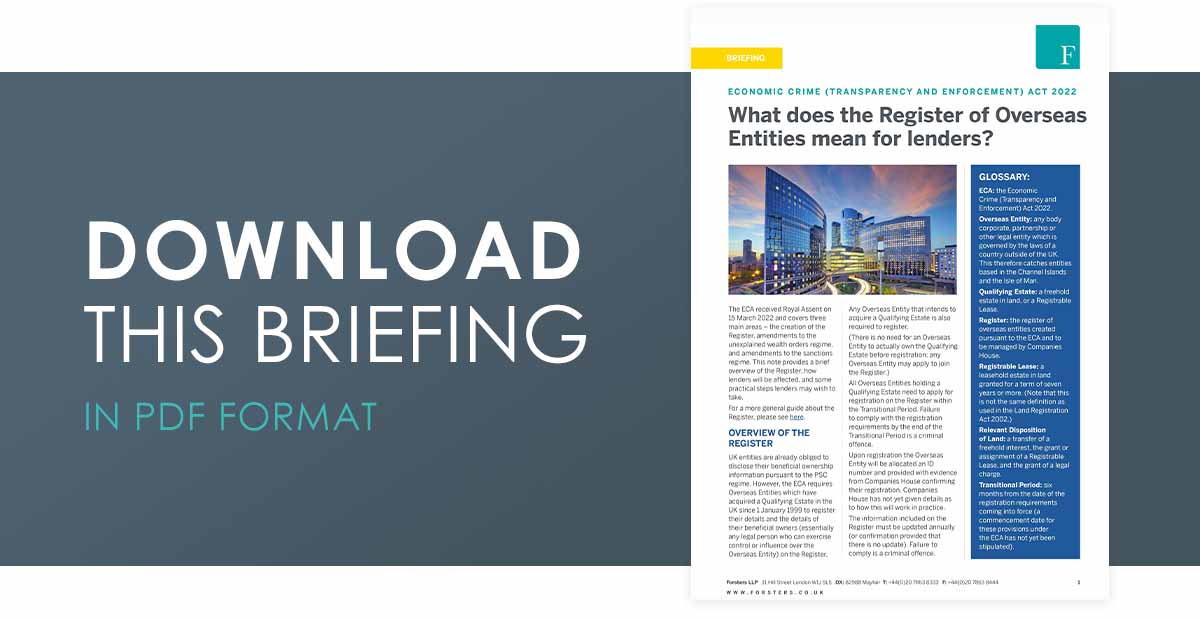Economic Crime (Transparency and Enforcement) Act 2022: What does the Register of Overseas Entities mean for lenders?

The ECA received Royal Assent on 15 March 2022 and covers three main areas – the creation of the Register, amendments to the unexplained wealth orders regime, and amendments to the sanctions regime. This note provides a brief overview of the Register, how lenders will be affected, and some practical steps lenders may wish to take.

Overview of the Register
UK entities are already obliged to disclose their beneficial ownership information pursuant to the PSC regime. However, the ECA requires Overseas Entities which have acquired a Qualifying Estate in the UK since 1 January 1999 to register their details and the details of their beneficial owners (essentially any legal person who can exercise control or influence over the Overseas Entity) on the Register.
Any Overseas Entity that intends to acquire a Qualifying Estate is also required to register.
(There is no need for an Overseas Entity to actually own the Qualifying Estate before registration; any Overseas Entity may apply to join the Register.)
All Overseas Entities holding a Qualifying Estate need to apply for registration on the Register within the Transitional Period. Failure to comply with the registration requirements by the end of the Transitional Period is a criminal offence.
Upon registration the Overseas Entity will be allocated an ID number and provided with evidence from Companies House confirming their registration. Companies House has not yet given details as to how this will work in practice.
The information included on the Register must be updated annually (or confirmation provided that there is no update). Failure to comply is a criminal offence.
What does this mean for UK land transactions?
During the Transitional Period the Land Registry must place a restriction on the title to any Qualifying Estate owned by an Overseas Entity and acquired on or after 1 January 1999. This restriction will take effect after the Transitional Period and will prevent the registration of any Relevant Disposition of Land unless the Land Registry has seen evidence that entry to the Register has been made, or that an exemption applies. This means that legal title will not pass unless the restriction on title has been complied with.
What does this mean for lenders?
The main focus for lenders is the potential impact of the ECA on (i) the registration by the Land Registry of a legal charge granted over a Qualifying Estate; and (ii) a lender’s ability to enforce such a charge.
- The grant of a legal charge: is a Relevant Disposition of Land and as such, in order to register the legal charge at the Land Registry, the Overseas Entity which holds the charged Qualifying Estate will need to be registered on the Register.
- Enforcement of registered legal charges: the ECA provides a number of situations in which a Relevant Disposition of Land will be registered by the Land Registry, notwithstanding the non-registration of the relevant Overseas Entity on the Register. These include where a secured creditor (or a receiver appointed by the secured creditor) exercises its power of sale under a registered legal charge and a disposition made by a specified insolvency practitioner in specified circumstances (although the actual meaning of “specified insolvency practitioner” and “specified circumstances” are yet to be provided).
The ranking of legal charges could also be affected by the Registrar of Companies’ ability to put in place a charge securing payment of financial penalties imposed for non-compliance with the ECA. The details of such a charge and how it will rank against other charges will be set out in regulations still to be published.
At present the legislation does not refer to any requirement to register legal charges over a Qualifying Estate against the Overseas Entity at Companies House.
What steps need to be taken?
Where an Overseas Entity is the borrower or the grantor of a legal charge over a Qualifying Estate, the “compliance with laws” clause in the finance documents is likely to cover its obligations under the Register, but specific provisions should also be included to focus borrowers’ minds on the need for compliance.
The required steps will depend on when the legal charge was or will be granted.
Scenario 1: Legal charge already registered at the Land Registry (since 1 January 1999)
- Lenders should be mindful of which of their clients and security arrangements will be affected by the new registration requirements and consider whether to remind any of their clients about the registration obligations under the ECA.
Scenario 2: Legal charge to be entered into prior to the Transitional Period
- Lenders should ensure that appropriate obligations are included in the finance documents, for example, undertakings that the Overseas Entity will apply to be duly registered within the Transitional Period, comply with the annual update requirements and provide the lender with evidence of such registration and compliance.
- The ability to grant a Registrable Lease should also be considered, for example, by including an undertaking that where such a lease is to be granted to an Overseas Entity, they will apply to be duly registered within the Transitional Period.
Scenario 3: Legal charge to be entered into during or after the Transitional Period
- A legal charge is a Relevant Disposition of Land and so can only be registered at the Land Registry if the Overseas Entity is registered in the Register.
- Ideally, the Overseas Entity in question should be registered in the Register before the finance documents are entered into, but in any event, the finance documents should include a provision, such as a condition precedent, requiring the Overseas Entity to be registered in the Register before a drawdown request is made (and within the permitted timeframe), obliging the Overseas Entity to comply with the annual update requirements and requiring the Overseas Entity to provide the lender with evidence of such registration and compliance.
- The ability to grant a Registrable Lease should also be considered, for example, by including an undertaking that such a lease will only be granted to an Overseas Entity which is duly registered in the Register.
GLOSSARY
Some of the terminology used in this article explained:
ECA: the Economic Crime (Transparency and Enforcement) Act 2022.
Overseas Entity: any body corporate, partnership or other legal entity which is governed by the laws of a country outside of the UK. This therefore catches entities based in the Channel Islands and the Isle of Man.
Qualifying Estate: a freehold estate in land, or a Registrable Lease.
Register: the register of overseas entities created pursuant to the ECA and to be managed by Companies House.
Registrable Lease: a leasehold estate in land granted for a term of seven years or more. (Note that this is not the same definition as used in the Land Registration Act 2002).
Relevant Disposition of Land: a transfer of a freehold interest, the grant or assignment of a Registrable Lease, and the grant of a legal charge.
Transitional Period: six months from the date of the registration requirements coming into force (a commencement date for these provisions under the ECA has not yet been stipulated).
Disclaimer
This note reflects the law as at 7 April 2022. The circumstances of each case vary and this note should not be relied upon in place of specific legal advice.





